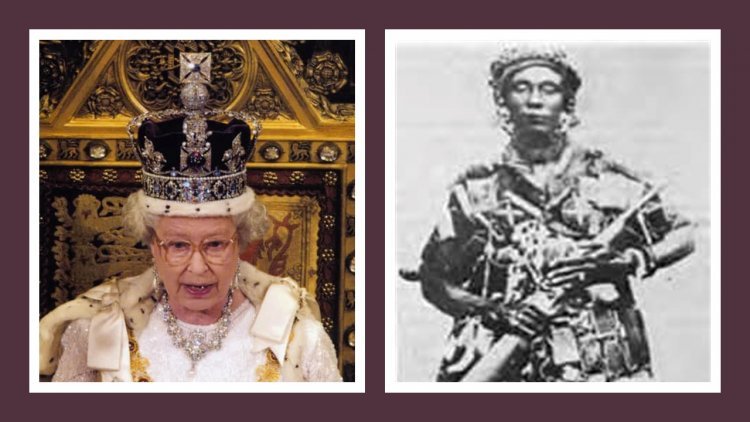Yaa Asantewaa necklace captured from Africa

Crepso Diallo writes
Among Elizabeth's jewelry that was seized from Africa comes the necklace of Yaa Asantewaa, a woman who organized the Ashanti (Ghana) revolt against the British. In 1896 Britain banished the Ashanti king and men from his authority to Seychelles. As his people were left without a leader, the British offered to fill this void, by appointing a representative of the British Kingdom. In March 1900, the British delegate and governor Frederick Hodgson sent a message to the local population to surrender and welcome him with open arms as their new master. However, it did not happen. When he asked for the holy golden seat to sit on, the Ashanti people were angry. They raised and publicly objected to his request. His response was to send soldiers with the consent of the people and to search for this seat, but the locals succeeded in killing all the soldiers. The British military siege on the Ashanti villages, however, continued for 3 and a half months.
After the siege intensified, Ashanti men and women met on an equal footing, to consult in response to the English endeavor. During the meeting, the men's opinion agreed on negotiating with the English and surrendering. A woman named Yaa Asantewaa declared her objection at the meeting. "If you, the Ashanti men, refuse to go to war, then we women will go ahead and fight until the last of us falls on the battlefields." She called for revolution and rebellion against the British, which led to the uprising, known as the Golden Seat War. The uprising lasted for two years from 1900 to 1902. Nana Yaa Asantewaa and her army of women laid siege until European reinforcements arrived, consisting of many soldiers and ammunition. It was headed by the officer known for his sadism against the Africans, James William Alex. Thus, he exterminated the peasants, massacred the Ashanti, and destroyed their villages, until the British succeeded in overrunning the villages. Yet the Ashanti saw that they had won despite that, for they did not leave the British occupier the opportunity to easily sit on the holy seat. Nana yaa Asantewaa died in exile in the Seychelles. In 1921, she was stripped of everything she owned for the sake of the British royal family.
